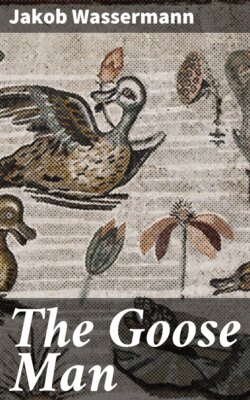Читать книгу The Goose Man - Jakob Wassermann - Страница 33
На сайте Литреса книга снята с продажи.
V
ОглавлениеTable of Contents
Not much could be learned from Döderlein’s maid. The efforts to draw something out of little Dorothea were also fruitless. She was wrapped up in her own affairs. She arranged her ribbons, played with her toys, recounted the small incidents of her uneventful life, and could hardly be persuaded even to listen to the ingenious questions Carovius put to her when he stopped her out in the hall and asked her about this and that.
One day he went over to Erlangen to visit his sister in the insane asylum. He thought that he might be able to get some clue to this mystery from her.
He found her sitting in the corner of a room, stroking her long, yellowish hair. Her head was bowed; her eyes were fixed on the floor. Through no cunning that he could devise was it possible to entice a single statement from her.
The physician said: “She is a harmless patient, but most secretive and passionate. She must have suffered for years from some heavy burden on her soul.”
Herr Carovius left her, and went back to the station. The sun was shining bright. He soon saw to his infinite discomfort that it was impossible to eliminate the picture of the melancholy woman from his inner eye. He went into a café and drank some whiskey. On the return journey an old woman sat opposite him who seemed to understand him. There was a trace of compassion in her eyes. This made him so uneasy that he found it necessary to change his seat.
He had met with unanticipated difficulties in his investigation. He recognised these fully, but consoled himself with the thought that there was still time. It occurred to him that he might somehow get hold of Dr. Benda and cross-question him. He recalled having seen Friedrich Benda meet little Dorothea on the stairway once, and no sooner had he seen her coming than he made every effort to avoid her. That set Carovius to thinking.
Some gas pipes had to be installed in the apartment about that time, and this gave him, as superintendent, a splendid opportunity to go up and see Benda. The doctor was just then making his final attempt to claim his rights—the rights of a man and a scholar—against the conspiracy of enemies who were really immune before the law.
He was all alone when Carovius called. He took him straight to his study. The walls of his hall as well as those of his room were covered with books from floor to ceiling. Benda said he was just getting ready to go on an extended journey. The finished politeness with which he removed the books from a chair and the tense way in which he eyed Herr Carovius made it clear to the latter that this was neither the time nor the place to engage in mock conversation. Carovius talked gas pipes. Benda finished all he had to say on this subject in two short, crisp sentences and got up to go.
Herr Carovius got up too, removed his nose glasses, and rubbed them with his bright blue handkerchief. “Where are you going, if I may ask?” There was an expression of apparent sympathy in his question.
Benda made it a habit never to treat any man impolitely, however little regard he might have for him personally. He said that he was going to Kiel to deliver his trial lecture at the university.
“Bravo!” cried Carovius, falling at once into the tone of awkward familiarity. “You have simply got to show those fellows that you are not a coward. Bravo!”
“I don’t quite understand you,” said Benda in amazement. His antipathy for the man was growing. And no one recognised this better than Carovius himself.
He cast a sideglance that reeked with hypocrisy at the young scholar. “My dear doctor, you must not look upon me as a poor uncultured yokel,” he said, “anch’ io sono pittore. I have read, among other things, your monograph on the morphogenetic achievements of the original sulcate cell. Listen, man! I take off my hat to that book. Of course, it is not exactly original, but then it is one of your earlier works. The idea developed in it follows pretty closely that of the evolutionary and mechanical theories of the much slandered Wilhelm Roux. And yet I am bound to say you display considerable independence in your method. Indeed you do. And more than that, you throw much needed light on the mysteries of God himself. There is a good deal of incoherent drivel these days about the freedom of science. Well, you’ll have to show me where it is. Scientists? They are a lot of conceited pin-heads, each working for himself, and incurably jealous of what his colleagues are doing. Up and at ’em, Doctor, that’s my advice, and luck to you!”
Benda was amazed to hear Carovius mention a work that was otherwise known only to specialists. This however merely tended to increase his distrust. He knew too much about the man to stand before him without a feeling of hostility. He merely needed to call to mind the story of the woman whose youth he had made into a waste place and a prison to be made aware of the fact that it was quite impossible to stand in his presence and breathe easily. The air of the room in which Carovius chanced to be was heavy, stuffy, depressing.
